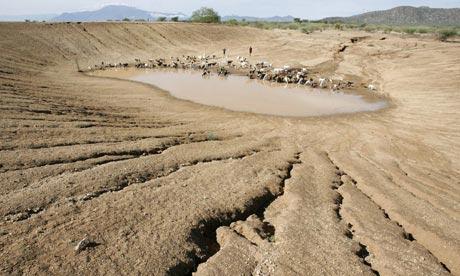We know global warming is already depressing yields of rice, wheat, and corn. This raises the price of these staples -- which, along with soya, ultimately account for three-quarters of the calories we eat. Among those already at the edge of starvation -- the 1.1 billion people living on less than a dollar a day -- sharply higher food prices will push some of them over the edge. Among the 925 million people who are undernourished, some will starve outright (some six million children a year) and many more will have their lives stunted or cut short by ill health. When you double food prices, as has happened over the last ten years, more of those people will go under.
Global warming is not the major driver of the current price rise -- food prices have also spiked due to increasing population and increasing consumption among the wealthy and middle class in the developing world. But they are contributing (and that contribution will only grow), and those that do not have the resources to fight for calories are among the first fatalities from climate change.
There will be some who say, and more who feel, that we can ignore these victims because they are poor, that better governments and better markets could have saved them, and that greenhouse gases and the warming therefrom can be just another export to the developing world from the rich world, that we can live with climate change in which they starve, and we cope with a big hurricane now and then. But that view is willfully blind to the facts. Yes, global warming will hit the poor first and hardest, but it won't stop there.
Eventually, if we do not act, those with the best governments and the best markets will be overcome too. Because of our institutions and our wealth, we have a much greater capacity to adapt, but not a limitless one. The poor, if I may be forgiven a cruel analogy, are canaries in a coal mine. And not just that. We are more connected to each other now than we were in the 20th century. People and their diseases move more freely. Nuclear weapons have spread more widely. Global terrorists have shown their reach. Climate isolationism is no more practical than the traditional sort.
There are those who say, "Let us ignore the continent of Europe. Let us leave it with its hatreds and its armaments, to stew in its own juice, to fight out its own quarrels, and decree its own doom. Let us turn our backs to this melancholy and alarmist view. Let us fix our gaze across the ocean and see our own life in our own dominions and empires."
There would be very much to this plan if only we could unfasten the British islands from their rock foundations, and could tow them three thousand miles across the Atlantic Ocean, and anchor them safely upon the smiling coasts of Canada; but I have not yet heard of any way in which this could be done. No engineer has come forth with a plan. It would, in any case, take a long time. Have we got a long time?



No comments:
Post a Comment